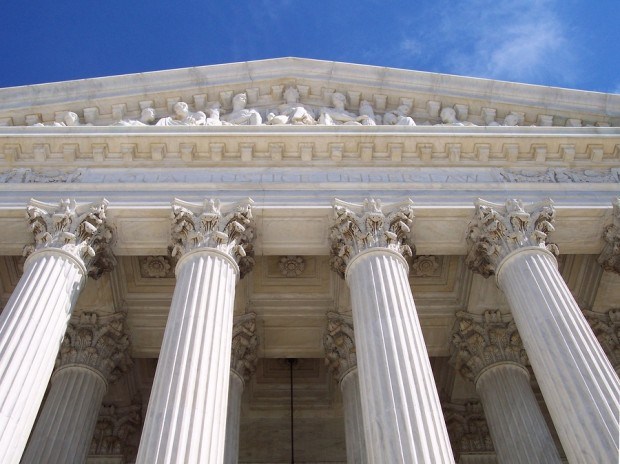Goldman Sachs Group Inc. suffered a defeat on Monday as the U.S. Supreme Court let stand a decision forcing it to defend against claims it misled investors about mortgage securities that lost value during the 2008 financial crisis.
Without comment, the court refused to consider Goldman’s appeal of a September 2012 decision by the 2nd U.S. Circuit Court of Appeals in New York.
That court’s action lets the NECA-IBEW Health & Welfare Fund, which owned some mortgage-backed certificates underwritten by Goldman, sue on behalf of investors in certificates it did not own, but that were backed by mortgages from the same lenders.
In afternoon trading, Goldman shares were down $2.47, or 1.6 percent, at $152.37 on the New York Stock Exchange.
Other bank stocks also fell, amid concern about an escalation of the euro zone crisis, with the S&P financial sector index down 0.7 percent.
Goldman and other banks have faced thousands of lawsuits by investors seeking to recoup losses on mortgage securities.
The bank has said that letting the 2nd Circuit decision stand could cost Wall Street tens of billions of dollars.
Goldman spokesman Michael DuVally declined to comment.
Darren Robbins, a partner at Robbins Geller Rudman & Dowd representing the plaintiffs, said about 10 cases within the 2nd Circuit are affected by Monday’s order, including one against JPMorgan Chase & Co. that his firm is handling.
He said the Goldman case will now proceed toward a possible trial. The NECA-IBEW fund is based in Decatur, Illinois.
“These mortgage-backed securities are ground zero for the mortgage meltdown,” Robbins said in a phone interview. “Our clients are certainly very pleased with the outcome. It reiterates the common sense test endorsed by the 2nd Circuit. It’s a good day for pension funds and investors, for sure.”
Fred Isquith, a class action and securities litigation specialist who is not involved in the Goldman case, said Monday’s order is important given other pending mortgage securities cases but that the fallout may be contained.
“If you expand the number of securities, you expand the amount of potential damages,” said Isquith, a partner at Wolf Haldenstein Adler Freeman & Herz. “How much more? I’m willing to bet dollars to donuts that when it comes down to dealing with actual damages, it will be less than they argued.”
‘VEXATIOUS’ LITIGATION FEARED
In the Goldman case, the issue was whether the NECA-IBEW fund, an electrical workers’ union pension plan that bought certificates from two of 17 trusts under a 2007 registration statement, could sue on behalf of investors in all 17 offerings.
The 2nd Circuit let the fund sue over seven of the offerings: the two it invested in, plus five others that also contained loans from GreenPoint Mortgage Funding, later part of Capital One Financial Corp, and Wells Fargo & Co . It said the other 10 offerings were too different.
Theodore Olson, a partner at Gibson, Dunn & Crutcher representing Goldman, warned in court papers that letting the 2nd Circuit decision stand “will effectively increase by tens of billions of dollars the potential liability that financial institutions face in this and similar class actions.”
Goldman said the case also merited review because it conflicted with a decision by the Boston-based 1st U.S. Circuit Court of Appeals involving Japan’s Nomura Holdings Inc.
The Securities Industry and Financial Markets Association and the U.S. Chamber of Commerce supported Goldman, saying they feared “vexatious, abusive litigation and coercive multimillion or billion dollar settlements to the detriment of the nation’s economy.”
In the JPMorgan case, the largest U.S. bank faces a lawsuit led by the Laborers Pension Trust Fund for Northern California and Construction Laborers Pension Trust for Southern California encompassing 10 mortgage offerings that they did not purchase.
JPMorgan spokeswoman Jennifer Zuccarelli declined to comment.
The Goldman case is Goldman Sachs & Co et al v. NECA-IBEW Health & Welfare Fund, U.S. Supreme Court, No. 12-528.
The JPMorgan case, which names a different plaintiff, is Fort Worth Employees’ Retirement Fund et al v. JPMorgan Chase & Co et al, U.S. District Court, Southern District of New York, No. 09-03701.
(Reporting by Lawrence Hurley and Jonathan Stempel; Editing by Howard Goller, Gerald E. McCormick, Jeffrey Benkoe, David Gregorio and Steve Orlofsky)





















 20,000 AI Users at Travelers Prep for Innovation 2.0; Claims Call Centers Cut
20,000 AI Users at Travelers Prep for Innovation 2.0; Claims Call Centers Cut  Chubb CEO Greenberg on Personal Insurance Affordability and Data Centers
Chubb CEO Greenberg on Personal Insurance Affordability and Data Centers  Earnings Wrap: With AI-First Mindset, ‘Sky Is the Limit’ at The Hartford
Earnings Wrap: With AI-First Mindset, ‘Sky Is the Limit’ at The Hartford  How Americans Are Using AI at Work: Gallup Poll
How Americans Are Using AI at Work: Gallup Poll 